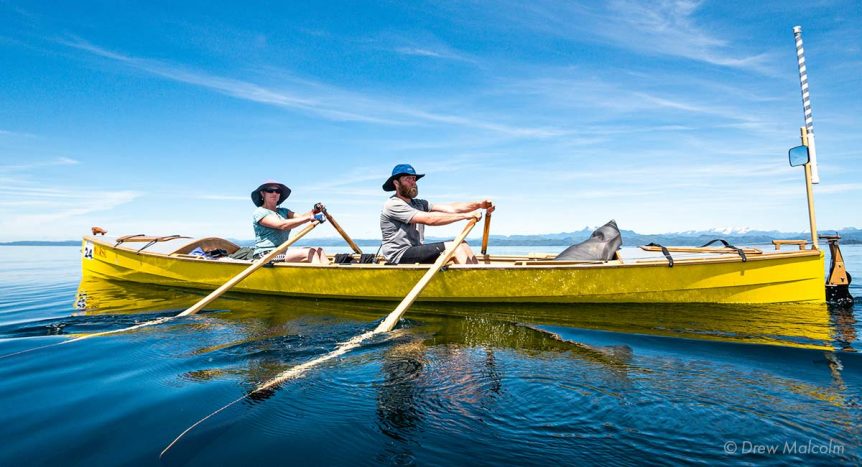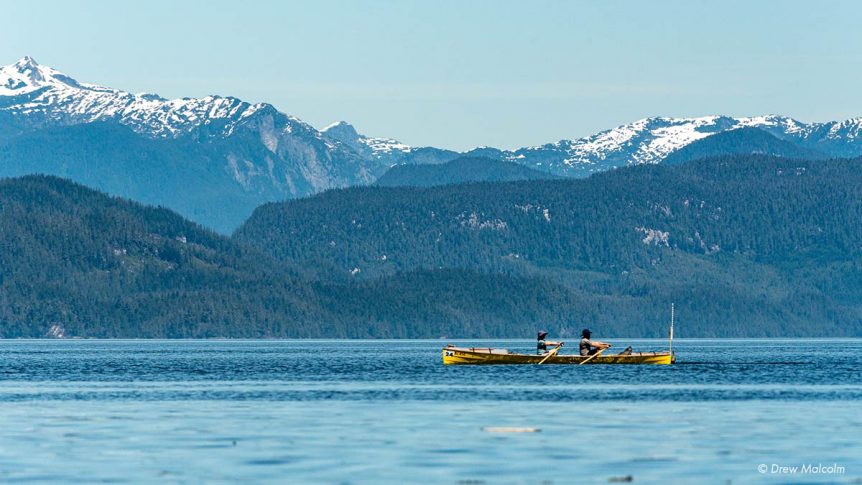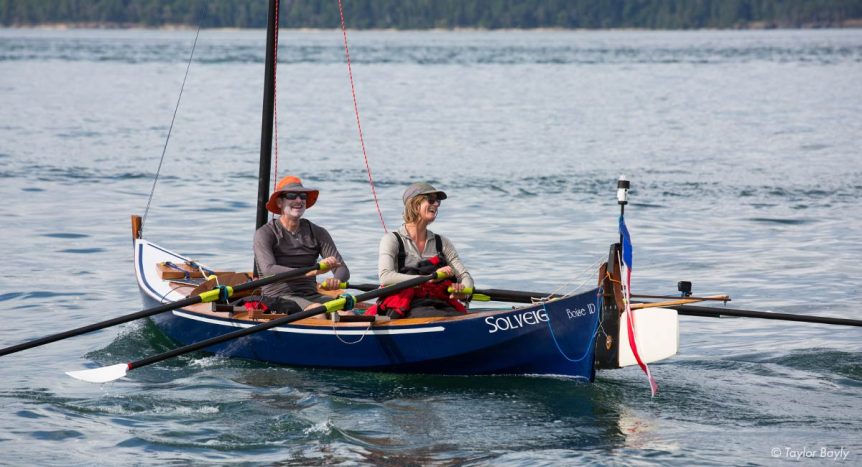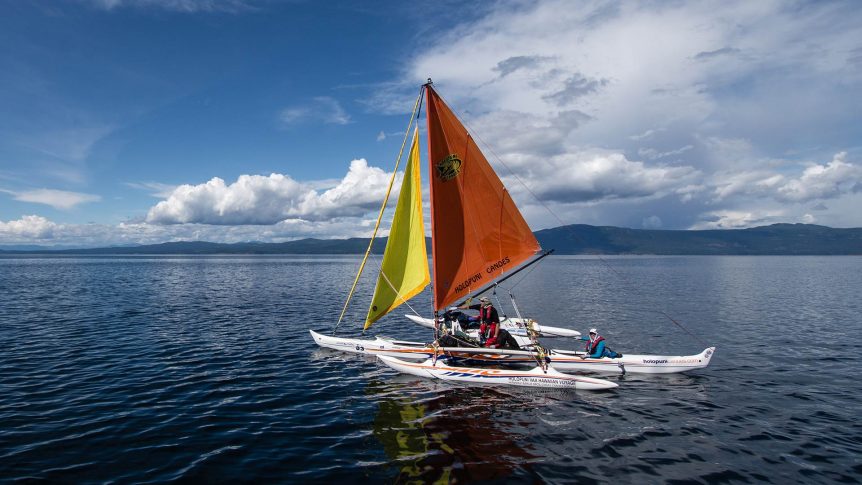Snow Row 2022!
On March 5th, Leigh and Clare rendezvoused at Windmill Point in Hull, MA for the Hull Lifesaving Museum's 41st Annual Snow Row. There was a strong Belfast contingent at the Snow Row with Come Boating sending two gigs down to the race. Mild weather and calm seas made for a great day filled with friendly competition.
It was Clare's first time competing and Leigh's first time competing in NORPPA. Despite a rocky start and an unfortunate de-seating (Clare is still perfecting her rowing form) it was a successful day and NORPPA finished first in her class and third overall. While a 3 3/4 mile race isn't quite comparable to the 750 miles from Port Townsend to Ketchikan it was an awesome start to Leigh and Clare's competitive racing career!
More info about the race can be found here.

Downeast Island Camping

Earlier this summer during a beautiful week in July, Leigh and Dameon took Leigh's dad, Chuck, out on a 4-day, 3-night rowing island hopping adventure as a delayed 60th birthday present. Leigh's sister Clare tagged along to round out the two 2-person crews of MURSU and NORPPA. It was Clare's first time rowing and the start of R2AK 2022 becoming a reality.

Another trip highlight was seeing rams on Ram Island!

Presentation on our 2019 R2AK

Thank you to all the friends and supporters who came to our presentation at the Belfast Free Library. Public speaking is a lot more daunting to us than a 50-mile row, but it was made as painless as possible by the warm and welcoming audience. If you didn't get a chance to attend, click here to see the Story Map we made to share our adventure.
Article in Belfast's Republican Journal
The local paper put our a short article about our Race to Alaska...it's a little wonky on some of the details, but, in the words of our good friend Laura, it's "cute."

Catapulting into the digital age...
Rowing to Wild now has an Instagram account! Still figuring it out and not very good at the whole #-thing, but we have managed to gradually post a series of photos from our trip, in sequential order. I'm up to Day 11 at this point...hopefully the rest will be up soon.
Instagram is cool and all, but this is the form of documentation that comes most naturally:

Our Spokesmen
Great video on Leigh and Dameon's adventure.
Our team is embarking on a much easier trip down the Inside Passage aboard an Alaskan State ferry. Below Dameon nestles Mursu next to their friendly competitor, Solveig, on the car deck.
Great Article From R2AK

Great article on our team from the R2AK site:
2019 Day 18: Team Backwards AF turns around
24 Hour Fact Sheet
Clip of the Day
photo: Team Backwards AF by Drew Malcolm
Even if you’ve spent time rowing crew in college, training for the bobsled team, or drawing the short straw for your part in the horse costume, you probably still have no idea about the level of metronome synchronicity delivered in nose to butt proximity that’s required to take a double rowboat anywhere, let alone Alaska. In our three minutes of exhaustive search, the only equivalent would be deciding that rather than driving, the best way to get anywhere would be to walk, but 8” behind someone else, and matching their pace—your feet inches behind and following in the wake of theirs. Until you get the hang of it, you’re going to trip a lot. Once you can hang you’re going to start hating looking at the back of their head, you’re going to resent the nuances of their pace, and you’re going to hate having to look behind you to make sure that you’re not going to run into anything, because in this grasping at straws analogy, you are synchronized walking backwards, backwards AF.
But synchronicity, unyielding backwards tenacity, and 144 energy bars combined as the main ingredients of Team Backwards AF’s success sauce that they slathered all over the finish line yesterday. They’re the 23rd team to cross the line, the only exclusively human-powered entrant, and in a record that doesn’t even exist, they are the fastest “oars-only” team in the five years of this thing—two days faster than Ian and Janice’s best time as the rowing incarnate of Team Oaracle. (Sorry Janice and Ian.)
Even if you do have experience in collegiate crew/olympic bobsled/costume horse assery, you probably haven’t done it for as hard, long, and far as Team Backwards AF. Unless you have already rowed to Alaska, it’s hard to fathom the depth of it (Yes, Janice, Ian, we know you have. Please put your hands down there will be time for questions at the end) and even then you might not pick up the nuances of a team that was the essence of simplicity and preparation.
How simple? Their race was the antithesis to the lifting foils, canting keels, and canting masts strategy of the twitchy front running teams whose campaigns were hopped up on complicated whizbang. Their complications started in their boats and continued after we delivered $10,000 on a nail and the internet debated whether fuel cells should be allowed if the moving parts they powered were related to propulsion. Team Backwards AF dunked on the debate with rim shattering authority by offering the simple, winning formula that strips away all of the complexity, all of the debate, and none of the hard: they rowed. They don’t even have sails, don’t even have a cabin. In another first, Team Backwards AF became the fastest alfresco sleeping team of 2019.
Compared to rowing, sailing is an activity for romantics, gamblers, and opportunists; you never know when the wind will pick up or change direction, and depending on how half full your glass is, the wind might even happen in the right direction. Sailing is somewhere between the R2AK’s running gun offense and Hail Mary pass—one day with the right conditions might take you all the way into the end zone. Rowing? Pure ground game, smash mouth and grinding it out 3 yards at a time. Rowing without prospect of sail is a double down on an all tortoise strategy with a 3,000+ calories-a-day habit. Zero flash, tons of hard work, zero hope of a longshot winger of a wind line from the heavens—even if they aren’t from the Scarlet Letter era New England, Team Backwards AF’s Maine roots would be our hands-down pick to be on the starting seven for the Puritan League All Star Game.
That last sentence is admittedly 20-100% punchline, but if we could time travel back to the +/- years when they cracked the seal on Thanksgiving, our hunch is that our founding Pilgrims would agree that minus the hats and abundance of buckles, Team Backwards AF is one of them. Prepared, hard working, steady, wholly without flash despite how impressive it is to make your way to Alaska in a rowboat, earning every mile one stroke at a time as the Puritanical God intended. They didn’t even try the technique of hugging the shore and working the eddies when the main current was against them. They just powered through.
Their campaign was defined by steady from the jump off. From their years of progressively harder voyages in their rowboat taking them from weekend camping trips in the islands off their Maine home, to their plan to row 40-50 miles a day, to actually rowing 40-50 miles a day. “We thought it would take 2-3 weeks.” Even with the one day they waited for weather before rounding Cape Caution, they hit their goal smack in the middle of those goal posts. 17 days. They had packed 20 days of food, and within minutes of finishing the race, they were talking about getting in their boat tomorrow to go check out some hot springs. They’re race was over, but they weren’t done. Their ferry back south didn’t leave until Thursday. There was so much to see.
Other than a stint in the Coast Guard tending buoys out of Cordova, this was their first trip to Alaska, and while nothing rattled them, they were impressed by the tides, the weather, and the complex waterways. “Every time we thought something was going to be easy…it wouldn’t be. It was hard everyday.” If the daily difficulty amounted to much more than a deepening of their determination, it certainly didn’t show on their faces or in their daily progress. Even the fact that they haven’t talked to anyone else for 17 days didn’t seem to grind on them. “We’d go for days without seeing another boat, and then we’d see a sail and be like, ‘Oh, there’s Ziska.’” Other than that and another tree/eagle/whale, they had 17 days of staying in sync, looking at the backs of each other’s heads, and trying to think of anything new to say. Given how tired they were and that they hadn’t been more that 8-10 feet apart for two weeks, the fact that they were still speaking to each other with emotions other than the barbs of cooped up resentment speaks volumes in itself.
The one thing they had wished was that they would have taken more time to train, but busy lives are what they are, and so they treated the first few days of the race as the boot camp in situ for their muscles and calluses to harden themselves. “We’ve rowed together a bunch in this boat, so there’s a lot of muscle memory there.” After that their life filled into a rhythm:
- Waking up, eating, breaking down their campsite, and stowing it all (1.5 hours)
- Rowing (12-15 hours)
- Setting up camp, eating, going to sleep (1.5 hours)
- Sleep (whatever time was left)
Sleeping ashore every night posed a challenge of finding beaches with at least a tent’s worth of space between the high tide line and the often impenetrable coastal rain forest. “One time we thought we were ok, but we woke up and the water was like 4 inches from our tent.” They moved. One day they were so tired they decided to tie their boat up in a kelp bed because they read about it the night before and desperately needed a rest. “It’s funny. You’re so tired, you take a five minute snooze and it feels so good.” Break too long, you lose momentum, but 5 minutes? Perfection. “You throw your hat over your face and pass out for five minutes. You wake up feeling like a million bucks.”
Rounding Cape Caution was their roughest day. There were confused seas, maybe a 4-5 foot chop. The boat is fast but sacrifices stability. The reality of rowing in those conditions isn’t like the two person water skimmer of some flat water race; it’s the boat rocking violently, and you try to grab a piece of whatever water you can without jamming your partner’s oar or slamming the handle of the oar into your wrist. Those can be scary moments, because it’s also the most likely time for a boat to scoop up some water, which increases the weight onboard, which makes it lower in the water, which makes it more likely to do it again. Plus, given the difficulty, your boat is probably doing half the speed it normally does which doubles your exposure time. You can only endure.
Luckily for them, their boat performed perfectly. “The only water we had to bail was when it rained for like 10 hours straight.” Their boat is designed for flat water, but both the team and the designer have been pleasantly and gradually surprised by its offshore ability.
There are teams that finish in Ketchikan with nothing left but their exhausted bodies and a book’s worth of the scariest kind of stories when they had backed themselves into a corner that beyond their limits, the limits of their boat, and they were a hole card away from not coming back. If Team Backwards AF had any whiff of that, we didn’t see it. They were tired, sure, who wouldn’t be after 750 miles that you earned one stroke at a time? Team Backwards AF had an adventure, but it wasn’t defined by any fate-tempting, nature roulette that we could see. Their adventure was one of accomplishment, consistency, and prudence. Compared to some of the hairball stories we hear on the finish line, their adventure was one that should be adored; especially by their families, and especially by our insurance broker.
Consistent with their consistency and preparations, Team Backwards AF has not only won the non-existent rowboat division of the R2AK, but they will be joining the ranks of the clever who discovered the cheapest way to get your boat back to the rest of the US. If it’s small enough that you can roll it on yourself, you can bring it to Bellingham on the Alaska State Ferries for $70.
Well concieved, well rowed, and well resolved. Turns out Team Backwards AF has been pretty forward looking the whole time.
Day 21-Over the Finish Line!
Leigh and Dameon will not sleep another night on a rocky shore. They are pushing to the finish in what will be their biggest mileage day. After making it to mainland Alaska last night they are less than an hour from Ketchikan and rowing hard.
They are in! Here's the video:
Day 20-Across Chatham Sound
Our team is in cell range again with the latest update: "Was pinned down Thursday in Grenville Channel due to winds. Friday managed to dodge the winds, wait thru the worst on a protected beach, and found a cabin on Rachael Islands after a sunset dash after the winds died down. Today headed for the north end of Dundas Island and a campsite on Little Gnarled Island."
Team Backwards must have decided to make hay while the sun shines and have pushed past the islands and will make the mainland tonight. They just passed the US border. Once out of the Sound they will be in protected waters for the rest of the run to Ketchikan. Here's a post and picture from the race website today: "One of the toughest teams in this year's Race To Alaska by Northwest Maritime Center lineup is still out there - Backwards AF! They're closing in at 4 knots with 100 miles to Ketchikan, AK."
Day 19-Into Malacca Passage
Our intrepid duo made their way out of Grenville Channel out into Malacca Passage in the face of northerly winds. Fortunately the strong winds of morning slacked, but Leigh and Dameon took extended breaks on small islands just east of Porcher Island and are still pressing on at 2100, one of their latest runs of the race. Was it tidal currents or winds that convinced them to wait? At any rate, they now are making a typical 4 knots and are perhaps loathe to waste an opportunity to row in calmer conditions. Solveig on the other had moved very little in the narrows of Grenville Channel. Having already rowed 30 miles Team Backward will likely land on upcoming Stevens Island as any farther island would put them well past midnight.
Tomorrow will our team cut straight across Dixon Entrance for Ketchikan or take a more cautious but longer route behind Dundas and Melville Islands?
Update: Leigh and Dameon camped on a scenic pocket beach on a tiny island between Stevens and Digby Islands.

Day 18-Windbound in Grenville?
Dameon and Leigh have not left their campsite as of 1430 today, perhaps due to the 17 knot winds pointed straight down the narrow Grenville Channel. Or did then hike up to a nearby lake to sunbathe and swim for the day? In any case, Team Solveig, a similar open rowing boat but with a sail, has closed to less than 30 miles after slogging along all morning.
Update: Unable to wait any longer, Team Backwards got on the water at 1600 in the afternoon, made only 2 knots pulling against a strong wind, and beached 4 hours later. Hopefully Friday will bring lesser winds.
Here's a picture of Mursu on the R2AK website:

A trailing competitor, Solveig:

Day 17-Grenville Channel
After spending the night on the mainland across from Gribbell Island Leigh and Dameon continued through Grenville Channel and have made good time, exceeding 6 knots at times. Certainly tidal currents in a channel 50 miles long and a half mile across are playing a role. Three quarters of the way to Ketchikan, they are even with a sailboat, Ziska, that has no wind in the Hecate Strait. Needing no wind they skimmed past Union Passage Marine Provincial Park, which looks exactly like the other 10,000 square miles of British Columbia coast but is no doubt a special place.
Update: Team Backwards has made camp in a cove near Freda Lake after 40 miles today.

Day 16-Through Princess Royal Channel
Our team has been making good time up Princess Royal Channel, up over 5 knots at times. No worries on getting lost or needing to make decisions in this narrow passage that's 50 miles long and 1 mile wide. As of late afternoon they've made 40 miles, we'll see how far they get.
Below is a picture of the vessel that got swamped, generating a rescue.

Day 15-Up the Inside Passage
Dameon and Leigh push on from their overnight on the mainland near Lady Douglas Island, at times getting a little help from current.
There was drama on the race early this morning when one of the racers, an outrigger sailing canoe, triggered an SOS on their satellite tracker about 45 miles south of Ketchikan. The Canadian Coast Guard rescued all 3 crewmembers with no injuries. The team was caught 15 miles from shore in 7 foot waves which swamped their small vessel. We can be sure that Team Backwards AF will stay closer to shore on that stretch.
Our team has laid up on a sandy beach on Sarah Island in the late afternoon after making about 33 miles. Unknown if they are waiting for a tide change or stopping for the night.

Day 14-Pit Stop in Bella Bella
Our intrepid team stopped in the village of Bella Bella and are in cell service for the first time in days. They provisioned themselves with essentials like toilet paper, sushi, and cookies. 3 times strangers stopped to give them food, the last a First Nation member who have them half a salmon and the other half to an eagle on the pier. Pushing on into Milbanke Sound.
Here's updates for previous days: When they had to stay in one place on Day 11 they were lucky to find a cabin for those two nights in a place called Skull Cove.
Crossing Cape Caution on Day 12 was an extremely hard day with the current against them. It's hard to find places to camp because driftwood trees are piled up right down to the high tide line. One night they had to move the tent right before getting swamped.
Last night (Day 13) they stayed in a place called The Trap, where a seal mama showed them a very new seal pup. There were bear tracks on the beach which has happened twice on the trip.
Day 13-Halfway there
Leigh and Dameon have settled in on a small island near the north tip of Hunter Island after covering over 40 miles today. They past the halfway mark today. Only 346 miles to go.

Day 12-Around the Cape
Dameon and Leigh are tackling the one of the most challenging stages of their journey: rounding Cape Caution between Queen Charlotte Strait and the protected waters of the Inland Passage. During the crossing the tracker showed them taking a break south of Table Island at a tiny island which has a fancy compound (lair?) complete with a bridge to a helipad. They pushed on and as of the late afternoon they had 3 miles left to reach the lee side of Calvert Island, making only 2 mph. Update: after what must have been a challenging day the team has made camp on the south end of Calvert Island. No helipad in sight.

Day 11-Beach Vacation?
Dameon and Leigh bivouacked on their tiny island for the entire day, most likely due to the 15 knot winds reported off Cape Caution and not because they found a margarita machine on the beach. Hopefully the full day's rest will invigorate them for the push around the cape tomorrow. Here's to light winds...

Day 10 - Laying Up Near Bramham
Leigh and Dameon made only 30 miles to the mouth of Queen Charlotte Strait and pulled in to a speck of an island near Bramham Island by 2 in the afternoon. Long since out of cell coverage, they are no doubt waiting for a full day and light winds to round unprotected Cape Caution.
Below is a post from the R2AK Facebook page.
Day 9 - Into Queen Charlotte Strait
Leigh and Dameon made about 42 miles as they left the Johnstone Strait into Queen Charlotte Strait. Leaving civilization behind they made camp on the British Columbia mainland as they prepare to approach the open waters of the Pacific.




















